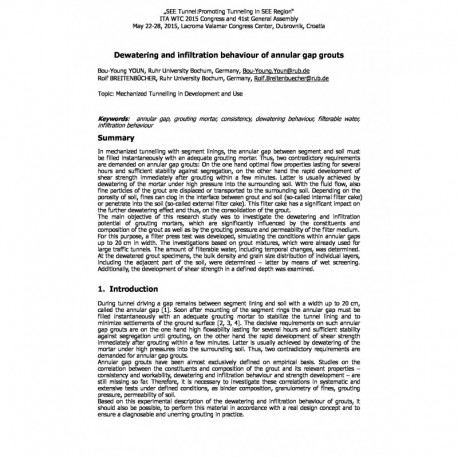Cart
0
0
No document
0,00 €
Total
Document successfully added to your shopping cart
Quantity
Total
There are 0 items in your cart.
There is 1 item in your cart.
Total documents
Total shipping
To be determined
Total
Search & filter
Search for a publication
Search & filter
Viewed documents

Dewatering and infiltration behaviour of annular gap grouts
wtc2015_fullpaper_bou-youngyoun
In mechanized tunnelling with segment linings, the annular gap between segment and soil must be filled instantaneously with an adequate grouting mortar. Thus, two contradictory requirements are demanded on annular gap grouts: On the one hand optimal flow properties lasting for several hours and sufficient stability against segregation, on the other hand the rapid development of shear strength immediately after grouting within a few minutes. Latter is usually achieved by dewatering of the mortar under high pressure into the surrounding soil. With the fluid flow, also fine particles of the grout are displaced or transported to the surrounding soil. Depending on the porosity of soil, fines can clog in the interface between grout and soil (so-called internal filter cake) or penetrate into the soil (so-called external filter cake). This filter cake has a significant impact on the further dewatering effect and thus, on the consolidation of the grout. The main objective of this research study was to investigate the dewatering and infiltration potential of grouting mortars, which are significantly influenced by the constituents and composition of the grout as well as by the grouting pressure and permeability of the filter medium. For this purpose, a filter press test was developed, simulating the conditions within annular gaps up to 20 cm in width. The investigations based on grout mixtures, which were already used for large traffic tunnels. The amount of filterable water, including temporal changes, was determined. At the dewatered grout specimens, the bulk density and grain size distribution of individual layers, including the adjacent part of the soil, were determined – latter by means of wet screening. Additionally, the development of shear strength in a defined depth was examined.


